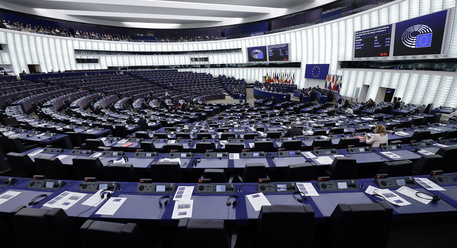(ANSA) - ROME, DEC 19 - In neighbouring Germany, the
country's Chancellor, Olaf Scholz, lost a confidence vote in
parliament on December 16, paving the way for early elections in
February that could end his time at the helm of Europe's biggest
economy and return the conservatives to power.
Scholz immediately asked President Frank-Walter Steinmeier to
dissolve parliament, the next step on the path to holding polls,
some seven months earlier than originally planned. The president
has 21 days to make that decision, a step considered a
formality.
Even though Scholz lost, as expected, it was the outcome he had
sought. His coalition collapsed following months of fierce
infighting over how to fix Germany's ailing economy and fill a
multi-billion-Euro gap in the 2025 budget.
Scholz has already been chosen as the SPD's top candidate for
the election, even though current polls put his party in third
place, behind the conservative CDU/CSU bloc and the far-right
Alternative for Germany (AfD).
In Austria, the far-right Freedom Party of Austria (FPÖ) has
established itself as the country's strongest political force
this year, winning the European elections in June with 25.4
percent and then also the general elections in September with
almost 29 percent. But the party remains far from power due to a
coalition that three other parties - the conservative Austrian
People's Party (ÖVP), the social democratic SPÖ and the liberal
Neos - intend to form, which plans to start governing next
January, provided they reach an agreement.
In Croatia, unlike some other EU member states, there have been
no major changes and the situation remains as stable as before.
Parliamentary elections were held in mid-April. A month later a
new government was formed, headed by third-time Prime Minister
Andrej Plenković (HDZ, centre-right) who's held the role since
2016. On December 29, Croats will go to the polls again in the
first round of presidential elections. Should no candidate win
an outright majority, the second round will be held on January
12.
Elections in the EU neighbourhood and around the world.
The United Kingdom, an EU member until 2020, saw the Labour
Party.
triumphantly return to the helm of the government - with Keir
Starmer as Prime Minister - after 14 years of conservative rule.
North Macedonia held presidential and parliamentary elections in
spring. Conservative Gordana Siljanovska Davkova (VMRO-DPMNE)
became the first female president of the country. The electoral
coalition "Your Macedonia" of VMRO-DPMNE, led by Hristijan
Mickoski won, putting the DUI party which had been in power for
16 years in varying coalitions into opposition.
Nestled at the intersection between Europe and Asia, the former
Soviet republic of Georgia went from being a star pupil of the
European Union in the post-Soviet space to being the last in
line for accession. After a process of rapprochement initiated
almost two decades ago, Tbilisi chose to freeze negotiations for
accession to the EU, which led to mass protests.
Tensions date back to 2023, when the parliament began debating a
Russian-style law on the "transparency of foreign influence".
The situation worsened after the incumbent and pro-Russian
"Georgian Dream" party, which has been in power since 2012, won
the parliamentary elections in October. The victory was not
recognized by the opposition and the West, which denounced
electoral fraud.
The political turmoil intensified after Tbilisi decided to
freeze dialogue with the EU, repressed massive pro-EU protests
and the election of the pro-Russian Mikhail Kavelashvili as
president by parliamentary vote.
In EU accession candidate Moldova, elections took place, too.
Pro-western Moldovan President Maia Sandu won a second term in
office. Sandu's challenger, Alexandr Stoianoglo, who was
considered the pro-Russian candidate, garnered about 45% of the
vote.
Voter turnout in the country, torn between the European Union
and Russia, was higher than in the first round on October 20,
with more than 54% of voters taking part in this round. The
voting day was punctuated by allegations of Russian interference
by Sandu and her national security adviser Stanislav Secrieru.
The EU accused Russia of "unprecedented" meddling in the votes
in Moldova that were seen as among the most pivotal in the
country's post-Soviet history.
But not only in Europe have citizens been called to the polls:
In India, the world's most populous country, general elections
were held - a process so large that it required a month and a
half of voting. With Claudia Sheinbaum, Mexico saw its
first-ever female president take office. But also across the
northern border, in the United States of America, presidential
elections have been held with Donald Trump set to return to the
Oval Office in January 2025 which sparked much discussion on the
future of EU-US relations.
(The content is based on news by agencies participating in the
enr, in this case AFP, Agerpres, BTA, dpa, EFE, HINA, MIA).
(ANSA).
Election Year 2024: 1st female presidents,shift to right (2)
Nearly half of the world's population were called to the polls
